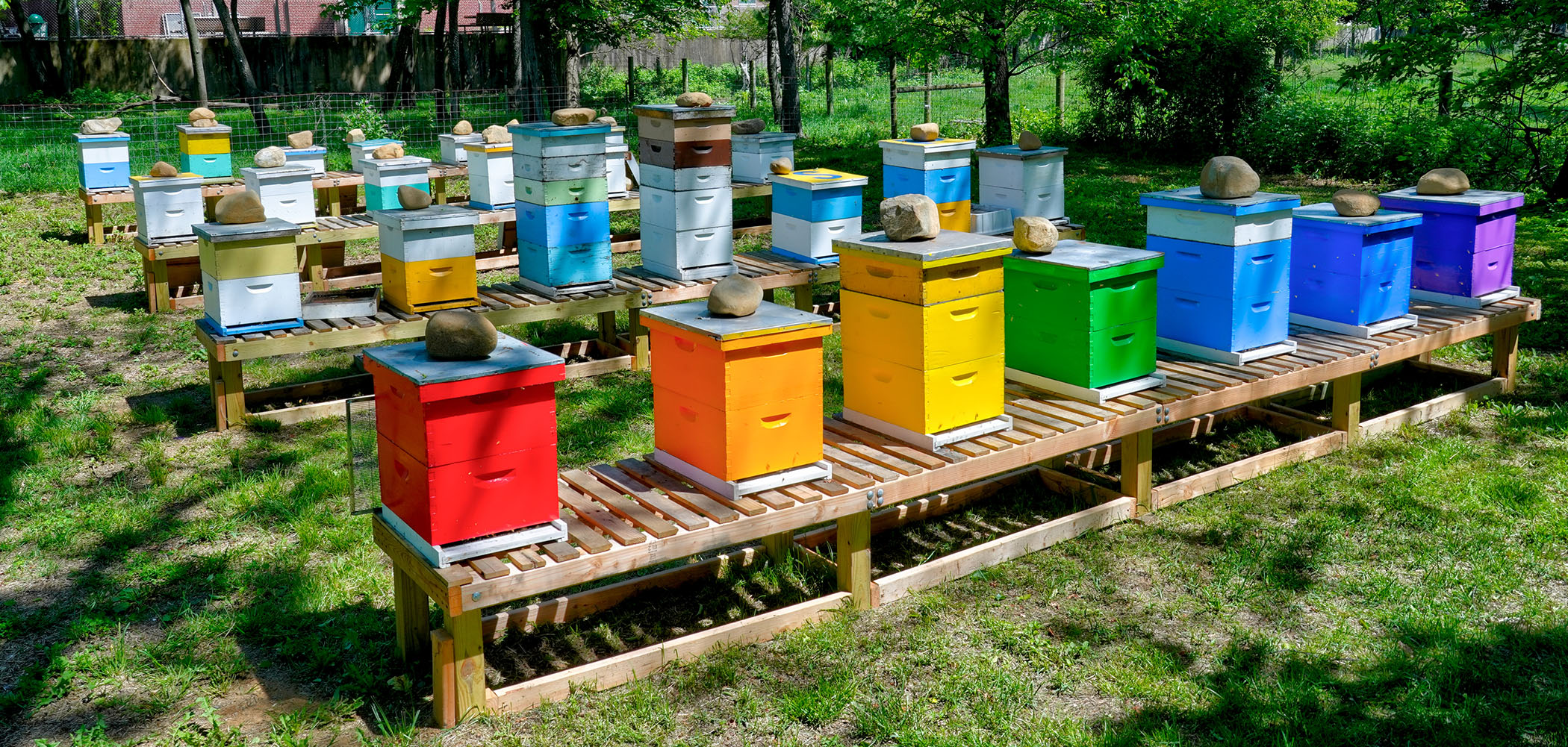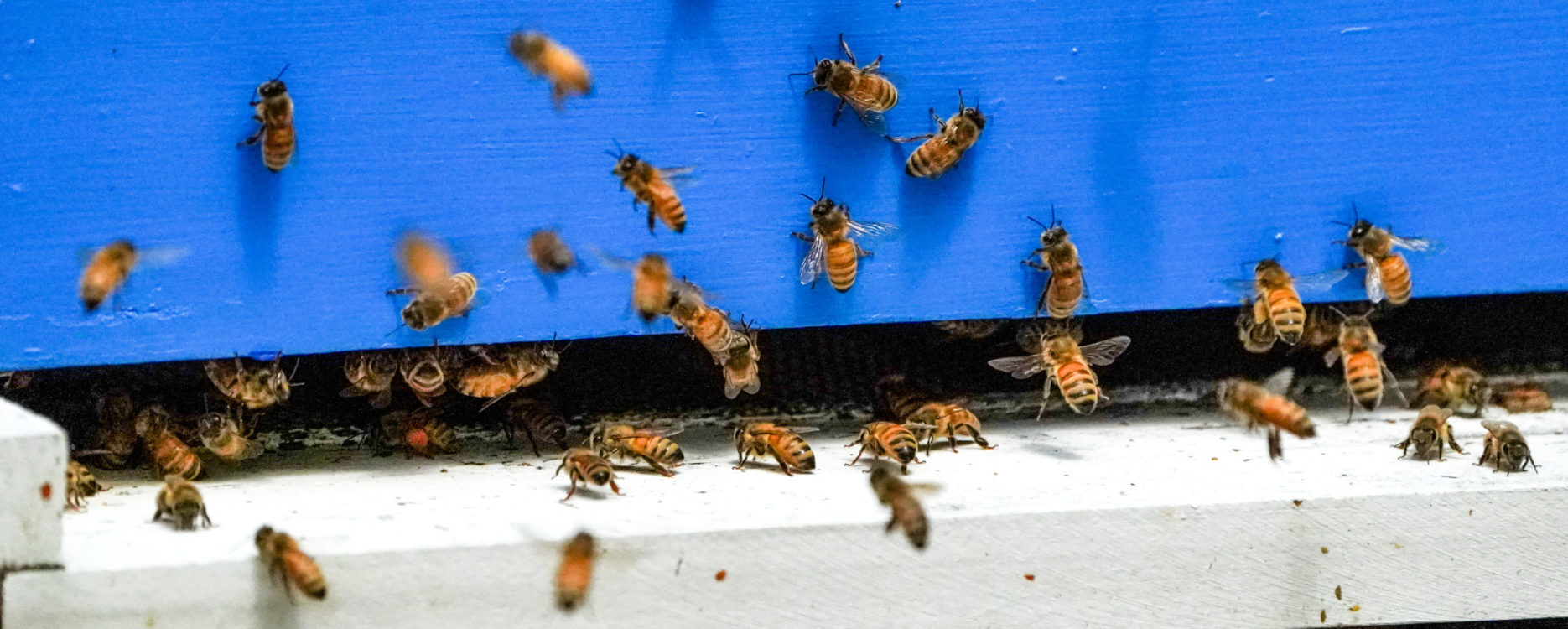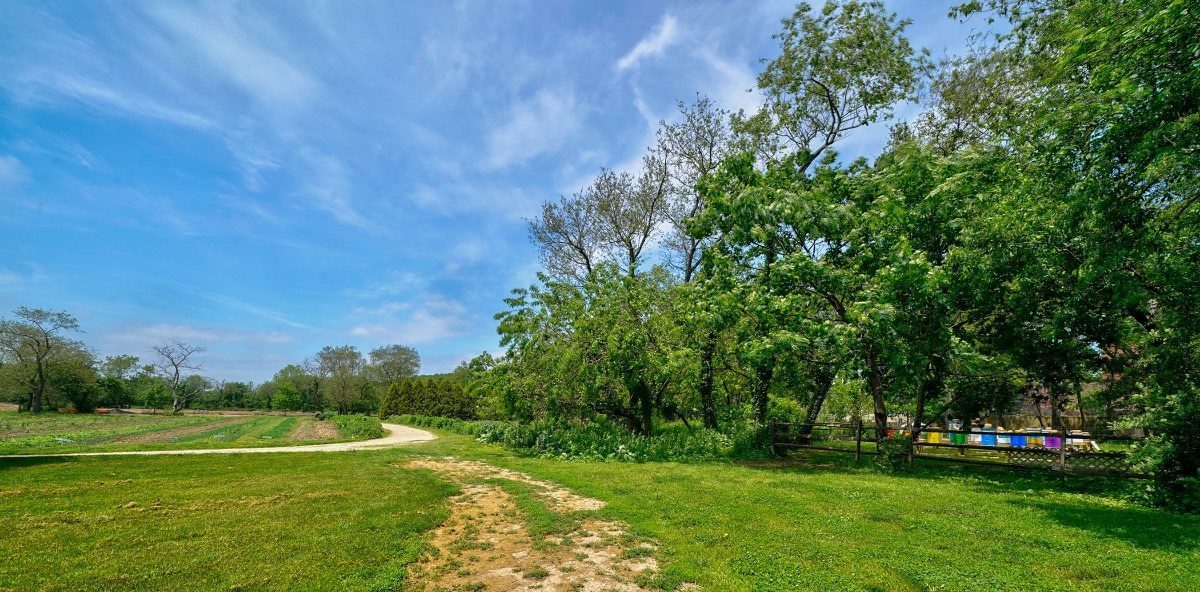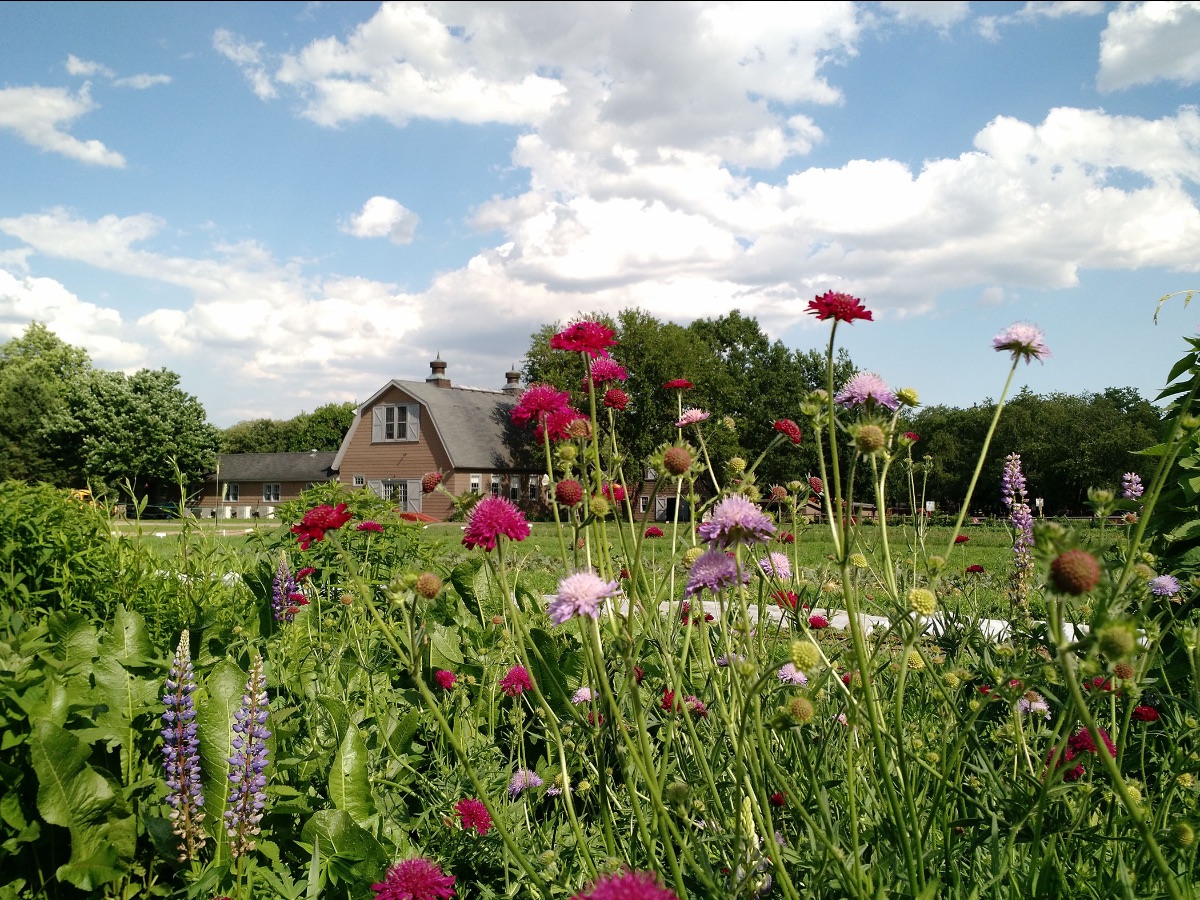Queens County Farm Museum Debuts
Largest Apiary in New York City
Queens County Farm Museum, the largest tract of farmland in New York City and one of the longest continually farmed sites in New York State, dating back to 1697, has partnered with Cornell University’s Dyce Lab for Honey Bee Studies and Andrew Coté of Andrew’s Honey, New York City’s leading Beekeeper, to create the largest single apiary in New York City.
Currently housing thirty colonies, when complete, the apiary will hold 50 beehives that will be home to over two million bees. This project will continue a 40-year history of honey bee pollination at Queens Farm. With these partners, the farm will create a new curriculum, exhibition and demonstration site that will become a model for teaching, learning, research, pollination and honey on a scale unmatched in New York City. The project, in part, includes beehives that once adorned the tops of the InterContinental New York Barclay, Brooks Brothers and the New York Institute of Technology, displaced due to COVID-19 building and business closures. These bees have found a refuge at Queens Farm.
With the newly expanded apiary, Queens Farm will increase the rate of pollination at the farm and surrounding area and build the farm’s production of honey tenfold to about 3,000 pounds per year in partnership with Andrew’s Honey. It will expand learning opportunities for students, families and adults by 35%, introduce new STEM curriculum as part of the farm’s acclaimed School-to-Farm Education Program and reimage its adult education programs including Bee Keeping 101 and Urban Beekeeper. The apiary will include demonstration hives to give a peek into the inner workings of the hive and feature a bee-cam to showcase live video of the busy bees.

Why Honey Bees?
The National Resource Conservation Service (NRCS) of the United States Department of Agriculture has reported that honey bees, along with other pollinators, contribute to one in three bites of food in the United States. Heading into the 2020 growing season, Queens County Farm Museum increased its crop plan by 38% and annexed an additional 1.6 acres of land from New York State that was part of the farm’s original footprint in 1697. This expansion supports Queens Farm’s work to increase food production to feed hungry New Yorkers through community based partnerships such as its relationship with Jamaica Hospital and the City University of New York (CUNY). Increased pollination is the bedrock of this work.
“The newly expanded apiary will help establish Queens Farm as a leading center for environmental research. This innovative project aligns the substantial size of 50 hives; the farm’s long-standing history of public programs and hosting honey bees with the uniqueness of our location on a 47-acre working farm in the midst of this enormous urban environment,” noted Jennifer Walden Weprin, Executive Director of Queens County Farm Museum. “We are very proud of our Queens Bees.”
“First off, these bees, and their beekeeper, are thrilled to be part of this project. At a time when all pollinators are in peril, having a refuge like the pesticide-free Queens Farm for these creatures to call home is a huge boon for urban beekeeping. The chance to work together with Cornell University’s Dyce Lab for Honey Bee Studies and Queens Farm is thrilling for this beekeeper, and from what I hear, the bees are smitten with the idea. Also, I have always wanted to raise queen bees in Queens, so, we commenced with our local queen rearing program in tandem with the commencement of the apiary. It is a picture perfect place for bees,” said Andrew Coté, Beekeeper-in-Residence at Queens Farm.

The Bee Informed Partnership, a national collaboration of leading research labs and universities, reported that in New York State between 42-68% of colonies have died each year since 2010 due to environmental factors. In response to these issues, The NYS Beekeeper Tech Team was established to help reduce honey bee colony loss. Queens County Farm Museum will be a cohort in Dyce Lab’s 2021 program.
“The NYS Beekeeper Tech Team is excited to expand our research and extension into the NYC area by enrolling Queens County Farm Museum in our program. The data we collect informs recommendations for best management practices, and I’m particularly curious to see how colony health, honey production, pesticide residues, and hive management differs in an urban setting compared to colonies kept in rural areas,” said Emma Kate Mullen, Senior Honey Bee Extension Associate from Cornell University’s Dyce Lab.
In addition to fulfilling a critical role in the lifecycle of the farm, this transformative program will help foster New York City’s environmental citizens through education, volunteerism and outreach. Each year, over 100,000 school children from almost every New York City Council District and families representing the diverse population of New York City learn and advocate through all aspects of Queens Farm – from the growing fields, livestock and compost area to the children’s garden, windmill and historic house. Queens Farm’s new apiary will expand its ability to connect visitors to the food they eat and the science of farming and the environment. Now, more than ever, New York City needs environmental stewards to guide this city into a greener tomorrow.
“Queens Farm has been nurturing environmental stewards for over forty years, making New York City a greener place to live, work, and raise a family. This apiary creates a learning and demonstration site on a new scale for the city’s students and educators,” said New York City Council Member Barry S. Grodenchik. “I am sure it will buzz with activity.”
COVID-19’s Effect on Queens Farm
Although the farm closed in March 2020 to the public due to the COVID-19 health crisis, essential staff have been on-site caring for the historic farm. While COVID-19 has slowed its momentum, the farm is enduring through careful care of its animals and crops and creating online programming to engage its audience. It is reimagining its education programs as it plans its own phased reopening. Queens Farm is developing new curriculum models for social-distanced learning and innovative plans to support New York City educators for Fall 2020.

About Queens Farm’s Apiary Partners
Andrew Coté’s family have been beekeepers since the 1800’s when his family owned a milk and honey farm in Quebec, Canada. Mr. Coté is the founding President of the New York City Beekeepers Association, which he established in 2007 and author of Honey and Venom: Confessions of an Urban Beekeeper (Penguin Random House, release date 6/9/20). Cornell’s Dyce Lab for Honey Bee Studies is the center for beekeeping resources in the Northeast. The lab’s focus is to promote a sustainable beekeeping industry by conducting applied research, providing educational programs, and supporting beekeepers.
About Queens County Farm Museum
Queens County Farm Museum is a New York City Landmark and on the National Registry of Historic Places. Queens Farm welcomes, on average, 400,000 annual visitors and has welcomed over 10 million visitors since 1975, when the cultural nonprofit that preserves and interprets the site was established.
The Queens County Farm Museum is located at 73-50 Little Neck Parkway in Floral Park, New York. It is an accessible site with free admission 354 days per year. The farm connects visitors to agriculture and the environment through the lens of the 47-acre historic site. It is a vital and rare resource in the ever-changing, continually developing urban setting of New York City.
Support for the new apiary has been provided, in part, by Andrew’s Honey, Cornell’s Dyce Lab for Honey Bee Studies and New York City Council Member Barry S. Grodenchik.

